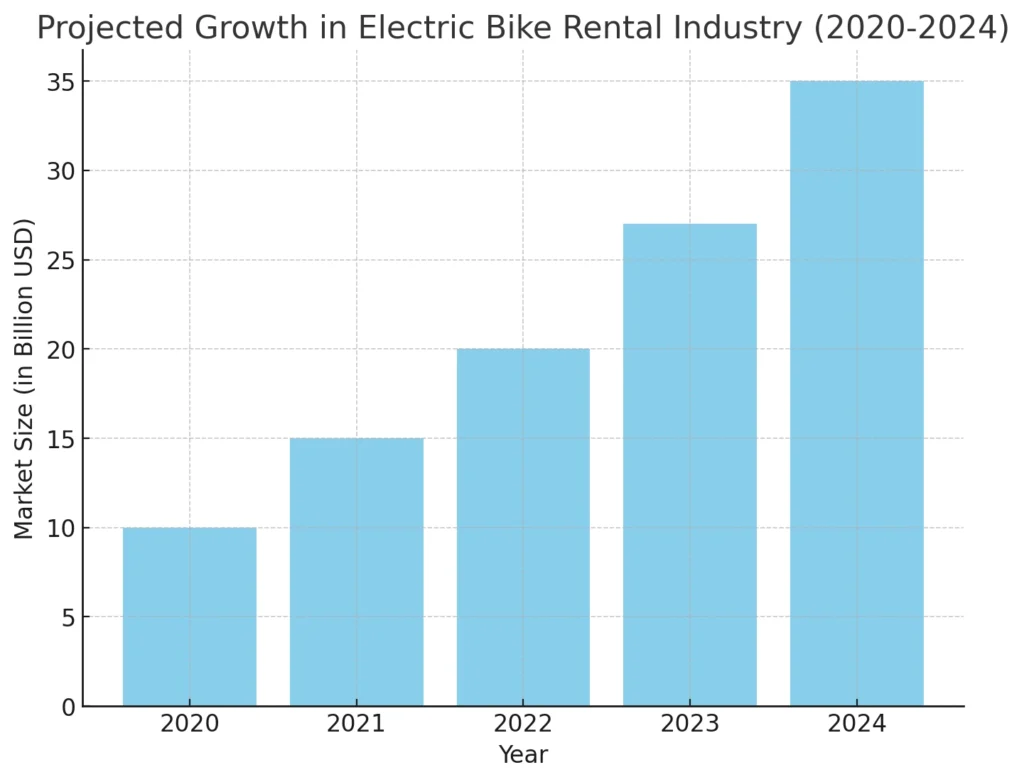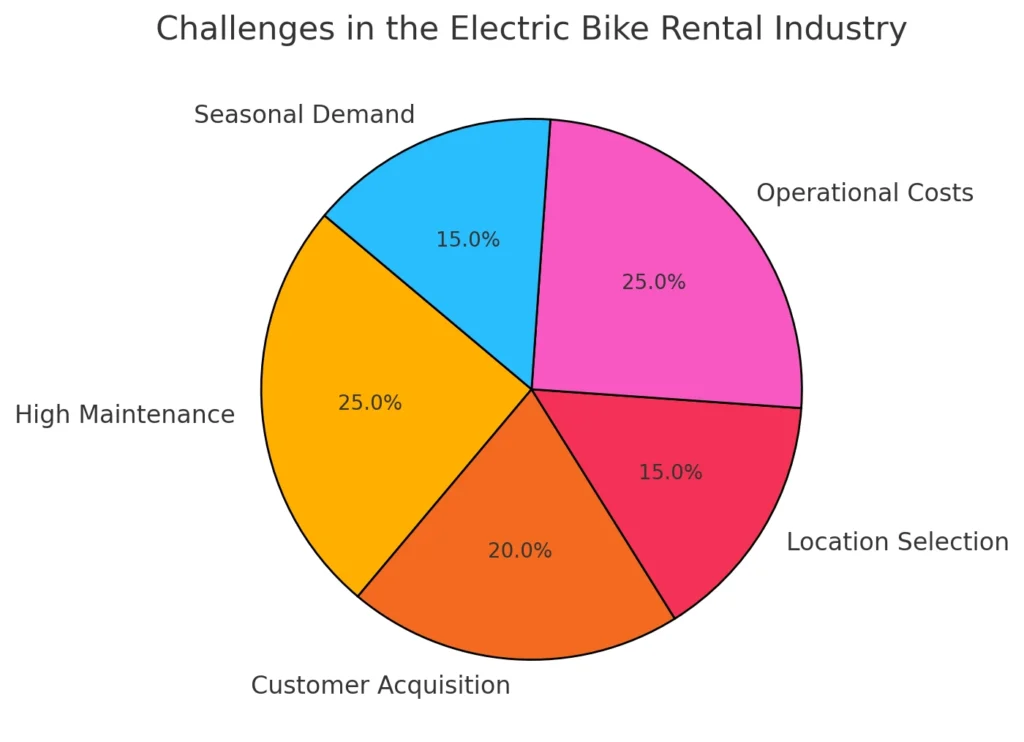In recent years, electric bikes have surged in popularity, revolutionizing the way people move within cities and beyond. Driven by eco-conscious consumers, shifting urban transportation needs, and the undeniable convenience of electric bikes (e-bikes), the e-bike rental industry is expanding rapidly. This trend is fueled by people seeking green, affordable, and flexible alternatives to traditional modes of transport. As 2025 unfolds, more entrepreneurs are eyeing this sector as a promising business opportunity with significant growth potential.
Starting an electric bike rental business offers more than just a profitable venture; it opens doors to community impact, aligns with sustainable living trends, and offers flexible business models. From city-specific rental services to tourist-focused experiences, there are numerous ways to tap into this burgeoning market. Whether you’re interested in launching an app-based rental service or setting up kiosks in high-traffic areas, the possibilities are varied and exciting.
| Metric | 2022 | 2023 | Projected for 2025 |
|---|---|---|---|
| Global Market Size (USD) | $15 Billion | $20 Billion | $27 Billion |
| Annual Growth Rate (%) | 25% | 30% | 35% |
| Urban Adoption Rate (%) | 40% | 50% | 60% |
| Top Regions for Growth | North America, Europe | Asia-Pacific, North America | Asia-Pacific, Europe |
| Average Daily Rentals per E-Bike | 5 rides/day | 6 rides/day | 7 rides/day |
Why Choose Electric Bike Rental?
The electric bike rental industry is more than a trend; it’s a powerful movement transforming urban landscapes and redefining personal transport. Today, cities are more congested, and environmental consciousness is higher than ever before. Electric bikes have become a preferred solution for city dwellers and travelers alike who seek an eco-friendly, quick, and efficient way to navigate busy streets. For entrepreneurs, this industry offers a rare blend of high demand, flexibility in business models, and relatively low startup costs, making it an ideal option to explore in 2025.

Electric bike rentals cater to diverse customer needs, including daily commuters avoiding traffic, tourists seeking easy exploration, and even residents looking for a convenient, low-cost alternative to car ownership. The industry’s appeal lies in its ability to offer on-demand transport without the emissions, hassle, or long-term commitment associated with traditional vehicle ownership. Furthermore, with cities investing in bike-friendly infrastructure and many regions promoting clean transportation, electric bike rentals have strong government support, giving a natural boost to new businesses in this space.
Reade More “Top 10 Ideas for Virtual Event Hosting Business Startups in 2024“
Current Trends and Future Opportunities in Electric Bike Rental
As urban populations grow and environmental concerns intensify, electric bike rentals are capitalizing on some of the most transformative trends in transportation. Today’s consumers are shifting toward sustainable choices, prioritizing eco-friendly transport that not only reduces their carbon footprint but also avoids the costs associated with fuel and car maintenance. In response, electric bike rentals have embraced innovations that streamline service, improve convenience, and attract a broader audience.
One of the leading trends is the integration of technology. Mobile app integration allows customers to locate, unlock, and pay for e-bike rentals with just a few taps, making the experience seamless and user-friendly. Some businesses are even incorporating AI and predictive analytics to understand demand patterns and position bikes in high-traffic areas, ensuring greater availability for customers. Additionally, as cities build dedicated bike lanes and promote sustainable commuting, the demand for rental e-bikes is likely to keep growing.
Battery technology is another exciting area of opportunity. Longer-lasting batteries enable e-bikes to travel farther on a single charge, reducing operational downtime for rental companies and providing a better experience for users. Businesses that invest in this technology can expect higher customer satisfaction and operational efficiency, both of which contribute to better profitability.
As cities build dedicated bike lanes and promote sustainable transportation solutions, the demand for rental e-bikes is likely to keep growing.
| Trend | Description | Impact on Business |
|---|---|---|
| Mobile App Integration | Allows customers to locate, unlock, and pay for e-bike rentals via a mobile app. | Enhances customer convenience and accessibility. |
| Predictive Analytics | Uses AI to predict demand and position bikes in high-traffic areas. | Increases availability, maximizes rentals, and improves user satisfaction. |
| Battery Technology | Advances in battery life, allowing bikes to travel further on a single charge. | Reduces downtime, improves operational efficiency, and attracts more customers. |
| Dedicated Bike Lanes | Infrastructure improvements in urban areas to accommodate bikes. | Boosts demand and improves safety, encouraging more people to rent. |
| Sustainable Operations | Use of solar-powered charging stations and recyclable materials. | Reduces environmental impact and attracts eco-conscious customers. |
Top 10 Ideas for Electric Bike Rental Business Startups
The electric bike rental industry offers diverse avenues for startups, each catering to unique customer needs and market opportunities. Here are ten trending ideas that stand out in 2025, providing options for every entrepreneurial vision, from urban commuters to adventure seekers.
| Business Idea | Startup Costs | Target Market | Estimated Profit Potential |
|---|---|---|---|
| City Commuter Rentals | Moderate | City residents, daily workers | High |
| Tourist and Sightseeing Rentals | Moderate to High | Tourists, out-of-town visitors | High |
| Subscription-Based Rentals | Low to Moderate | Long-term users (students, workers) | Moderate |
| Adventure and Off-Road Rentals | High | Adventure tourists, weekend warriors | High |
| Eco-Tour Rentals | Moderate | Environmentally conscious travelers | Moderate |
| Corporate Rentals for Employee Benefits | Moderate to High | Companies, employees | High |
| Pop-Up Rental Stations | Low to Moderate | Event attendees, tourists | Moderate |
| E-Bike Rental Kiosks at Hotels | Moderate | Hotel and resort guests | High |
| Delivery and Cargo E-Bike Rentals | High | Small businesses, delivery services | High |
| Seasonal E-Bike Rental Passes | Low to Moderate | Seasonal tourists, locals | Moderate |
1. City Commuter Rentals
Offer quick and affordable e-bike rentals for daily city commuters needing short-distance transportation.
- Target Market: City residents, daily workers
- Estimated Costs: Moderate (initial fleet, app development)
- Startup Requirements: E-bike fleet, high-density stations, mobile app for bookings
2. Tourist and Sightseeing Rentals
Provide hourly or daily rentals tailored for tourists exploring city landmarks and attractions.
- Target Market: Tourists, out-of-town visitors
- Estimated Costs: Moderate to high (fleet size, app customizations)
- Startup Requirements: Central pickup locations, multilingual app, route suggestions
3. Subscription-Based Rentals
Offer monthly subscription plans for frequent riders, giving long-term users cost-effective access to e-bikes.
- Target Market: Students, city workers
- Estimated Costs: Low to moderate (subscription management system)
- Startup Requirements: Flexible pricing plans, quality bikes, subscription management platform
4. Adventure and Off-Road Rentals
Rent rugged e-bikes suited for off-road trails, catering to thrill-seekers and adventure tourists.
- Target Market: Adventure tourists, weekend warriors
- Estimated Costs: High (specialized equipment, insurance)
- Startup Requirements: Off-road e-bikes, locations near trails, safety gear
5. Eco-Tour Rentals
Provide e-bike rentals focused on eco-friendly scenic routes, promoting sustainable travel.
- Target Market: Environmentally conscious travelers
- Estimated Costs: Moderate (eco-friendly bikes, premium pricing potential)
- Startup Requirements: Eco-friendly bikes, partnerships with nature reserves, curated eco-tour routes
6. Corporate Rentals for Employee Benefits
Partner with companies to offer e-bikes as an employee benefit, promoting wellness and green commuting.
- Target Market: Companies, employees
- Estimated Costs: Moderate to high (fleet expansion, maintenance)
- Startup Requirements: Corporate partnerships, subscription model, regular maintenance
7. Pop-Up Rental Stations
Set up temporary e-bike rental stations for festivals, events, or peak seasons to cater to high demand.
- Target Market: Event attendees, tourists
- Estimated Costs: Low to moderate (flexible, temporary setups)
- Startup Requirements: Mobile check-in stations, adaptable pricing, temporary stations
8. E-Bike Rental Kiosks at Hotels and Resorts
Offer on-site e-bike rentals at hotels and resorts for guests exploring local attractions.
- Target Market: Hotel and resort guests
- Estimated Costs: Moderate (fleet size, kiosk setup)
- Startup Requirements: Hotel partnerships, branded kiosks, guest-friendly bikes
9. Delivery and Cargo E-Bike Rentals
Provide cargo-capable e-bikes for short-distance deliveries, aimed at small businesses and local delivery services.
- Target Market: Small businesses, delivery services
- Estimated Costs: High (durable, cargo-capable bikes)
- Startup Requirements: Sturdy cargo e-bikes, insurance, business partnerships
10. Seasonal E-Bike Rental Passes
Offer unlimited e-bike passes for specific seasons, like summer, allowing customers unlimited rides within that period.
- Target Market: Seasonal tourists, local residents
- Estimated Costs: Low to moderate (seasonal marketing)
- Startup Requirements: Seasonal pricing strategy, targeted marketing campaigns
Real-World Examples
The electric bike rental industry has seen inspiring success stories from companies that transformed the transportation landscape in cities worldwide. By addressing common commuter challenges, capitalizing on eco-friendly trends, and harnessing technology, these businesses have grown rapidly, proving the potential for profitable, impactful startups.

One standout example is a city-focused e-bike rental startup that launched with a small fleet but quickly scaled up due to high demand. By placing their stations strategically near public transport hubs, this company was able to serve as a “last mile” solution for commuters, offering affordable rentals to cover short distances between transit stops and final destinations. Through simple mobile app access and a pay-as-you-go model, they made transportation easier and faster for city residents. This strategy not only attracted daily commuters but also tourists who valued the flexibility of hop-on, hop-off access around major city attractions.
Another success story comes from a startup that partnered with eco-tourism sites, offering guided e-bike tours that focus on environmental conservation. This business capitalized on a niche market by designing scenic routes and collaborating with nature reserves, providing travelers with a unique, eco-friendly way to explore. This model has attracted environmentally conscious travelers and adventure seekers who appreciate the sustainable experience. The success of this approach highlights how focusing on specific customer interests, such as eco-tourism, can create a loyal customer base and drive repeat business.
One standout example is a city-focused e-bike rental startup, part of electric bike sharing success stories that have transformed urban commuting.
Mistakes to Avoid When Starting a Business in Electric Bike Rental
| Mistake | Description | Preventive Measure |
|---|---|---|
| Poor Location Selection | Setting up rental points in low-traffic areas | Conduct footfall analysis and choose high-traffic zones |
| Inadequate Fleet Maintenance | Neglecting regular bike upkeep | Implement strict maintenance schedules and quality checks |
| Unclear Pricing Model | Offering confusing or inflexible pricing options | Create clear, app-based hourly, daily, and weekly rates |
| Overlooking Customer Experience | Failing to provide user-friendly services | Invest in an intuitive app, prompt support, and route suggestions |
| Lack of Marketing | Minimal visibility and brand awareness | Use social media, local partnerships, and promotions |
Reade More “Top 10 Ideas for B2B Equipment Rental Business Startups“
Entering the electric bike rental market can be highly rewarding, but like any business, it comes with its own set of challenges. Knowing the common mistakes and how to avoid them can be the difference between a thriving startup and a struggling business. Here are the most critical pitfalls to watch for and ways to steer clear of them.
One of the most frequent mistakes is underestimating the importance of location selection. A great e-bike rental service needs to be conveniently accessible. If rental points are set up in low-traffic areas, it can severely limit business. Ideal locations are close to public transit hubs, tourist attractions, or in densely populated urban areas. Performing a detailed analysis of high-footfall zones can help ensure the service is visible and readily available where customers need it most.
Inadequate fleet maintenance is another common oversight. Electric bikes require regular upkeep to ensure safety and optimal performance. Neglecting maintenance not only poses a risk to customers but can lead to costly repairs down the line. Successful companies typically follow strict maintenance schedules and invest in quality parts to prevent unexpected breakdowns. This practice keeps the business running smoothly and earns customer trust.
Failing to create a clear pricing model can also hinder growth. Offering a confusing or poorly structured pricing plan may deter customers from using the service. Transparent, flexible options—such as hourly, daily, and weekly rates—allow customers to choose what best suits their needs. Many successful e-bike rental services use app-based pricing, enabling customers to understand fees and track their usage easily.
Overlooking customer experience is a mistake that new businesses often make. A friendly, easy-to-use app, prompt customer support, and user-friendly e-bikes all contribute to a positive experience. Adding features like route suggestions, real-time bike availability, and easy payment methods can make a service more appealing and encourage repeat business.
Why Trust Miracuves Solutions for Your Next Project?
When launching an electric bike rental business, having a reliable partner can be a game-changer. Miracuves Solutions brings unparalleled expertise to the table, offering ready-made, cost-effective app solutions tailored to the unique needs of this industry. With a proven track record in developing user-friendly, high-performance applications, Miracuves Solutions empowers entrepreneurs to enter the market confidently and efficiently.
One of the standout advantages of partnering with Miracuves Solutions is their deep understanding of the electric bike rental ecosystem. Their app solutions come with essential features like GPS tracking, seamless payment integration, real-time bike availability, and data analytics—all designed to enhance customer experience and streamline operations. By providing these features in an easy-to-use, ready-made package, Miracuves Solutions helps reduce development time and costs, allowing you to focus on scaling your business.
Additionally, Miracuves Solutions emphasizes client success, delivering flexible, scalable solutions that grow with your business. Their development approach prioritizes adaptability, ensuring that as your company expands or new features are needed, your app can be upgraded without a complete overhaul. This approach not only saves time but also ensures your business stays competitive in the rapidly evolving e-bike rental industry.
Miracuves Solutions is more than just a tech provider; they are a committed partner dedicated to helping you succeed. With their experience, innovation, and client-centered approach, they make it easier for startups to thrive in the electric bike rental market.
Conclusion
The electric bike rental business is more than just a timely venture; it’s an opportunity to contribute to sustainable urban mobility while tapping into a profitable market. By embracing current trends, focusing on high-demand locations, and investing in quality customer experiences, entrepreneurs can create a thriving service that meets the needs of today’s eco-conscious travelers and commuters. The flexibility within this industry allows businesses to tailor their offerings, from commuter-friendly city bikes to scenic eco-tours and rugged off-road rentals, catering to various customer needs.
Success in this field requires careful planning, market understanding, and a strong operational foundation. By sidestepping common mistakes, investing in innovative technology, and focusing on customer satisfaction, a startup can carve out a significant place in the e-bike rental market.
FAQs
What are the key steps to start an electric bike rental business?
To start an electric bike rental business, choose a business model, secure a fleet of quality e-bikes, set up accessible rental locations, and develop a user-friendly app or platform for rentals and payments.
How much does it cost to start an e-bike rental business?
Startup costs can vary but typically range from moderate to high, depending on fleet size, location, and technology needs. You can start small and scale up as demand grows.
What are the most common challenges in the e-bike rental industry?
The main challenges include bike maintenance, customer acquisition, and choosing high-traffic locations. Regular maintenance and strategic marketing can help overcome these obstacles.
How can I attract customers to my e-bike rental service?
Attract customers by marketing your service on social media, collaborating with local businesses or hotels, and offering discounts or loyalty programs. Convenience and visibility are key to drawing in customers.
Why are e-bike rentals popular with urban commuters and tourists?
E-bike rentals offer a convenient, eco-friendly, and affordable mode of transportation. Commuters avoid traffic, and tourists get an easy way to explore cities, making it appealing for a broad range of users.








